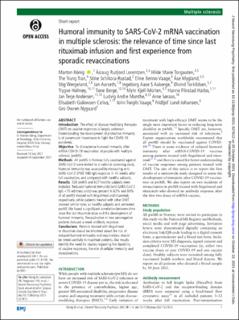Humoral immunity to SARS-CoV-2 mRNA vaccination in multiple sclerosis: The relevance of time since last rituximab infusion and first experience from sporadic revaccinations
König, Marton; Lorentzen, Åslaug Rudjord; Torgauten, Hilde Marie; Tran, Trung; Schikora-Rustad, Stine; Vaage, Eline Benno; Mygland, Åse Daasvand; Wergeland, Stig; Aarseth, Jan Harald; Aaberge, Ingeborg Sundsvalen; Torkildsen, Øivind; Holmøy, Trygve; Berge, Tone; Myhr, Kjell-Morten; Harbo, Hanne-Cathrin Flinstad; Andersen, Jan Terje; Munthe, Ludvig Andre; Søraas, Arne Vasli; Celius, Elisabeth Gulowsen; Vaage, John T.; Lund-Johansen, Fridtjof; Nygaard, Gro Owren
Peer reviewed, Journal article
Published version

Permanent lenke
https://hdl.handle.net/11250/3001235Utgivelsesdato
2021Metadata
Vis full innførselSamlinger
Sammendrag
Introduction The effect of disease-modifying therapies (DMT) on vaccine responses is largely unknown. Understanding the development of protective immunity is of paramount importance to fight the COVID-19 pandemic. Objective To characterise humoral immunity after mRNA-COVID-19 vaccination of people with multiple sclerosis (pwMS). Methods All pwMS in Norway fully vaccinated against SARS-CoV-2 were invited to a national screening study. Humoral immunity was assessed by measuring antiSARS-CoV-2 SPIKE RBD IgG response 3–12 weeks after full vaccination, and compared with healthy subjects. Results 528 pwMS and 627 healthy subjects were included. Reduced humoral immunity (anti-SARS-CoV-2 IgG
